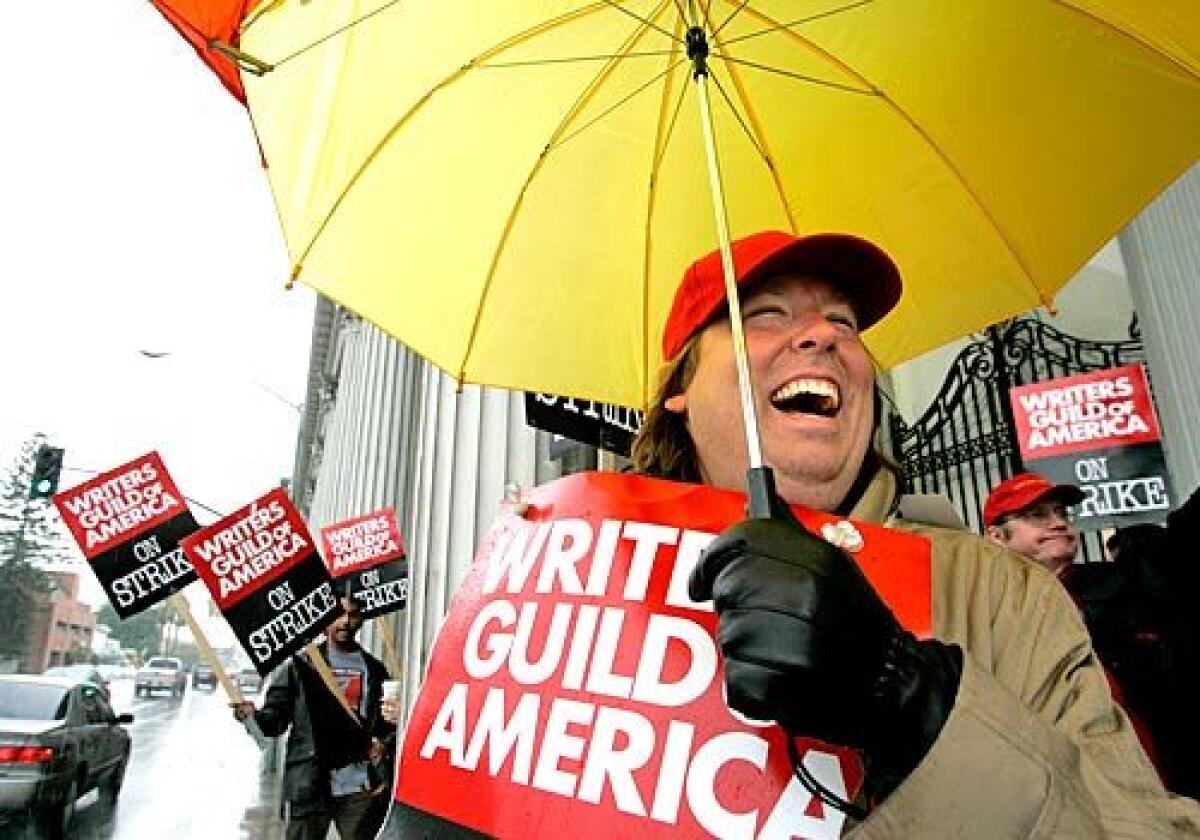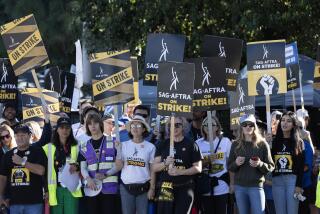Hey, that ad-lib wasn’t in the script!

Everett Hitch and Virgil Cole had been riding all day, chasing bad guys across the chaparral in the western “Appaloosa.” As actors Viggo Mortensen (who was playing Hitch) and Ed Harris (Cole) sat around a campfire filming a scene on the Galisteo, N.M., set, Mortensen improvised a line. “I’m about ready,” he grumbled, “to make a pair of chaps out of that Godforsaken mule.”
It was the kind of ad-libbing that happens on almost any movie and, given Mortensen’s cranky but erudite “Appaloosa” character, a perfectly fitting riff. But was the actor being a quick-on-his-feet movie star or a strike breaker?
As it happens, Mortensen’s new dialogue was kosher, but it illustrated the gray area affecting scores of movies in production. If Mortensen had been a Writers Guild of America member, as many actors including costar Harris are, and if he had typed up his new line, he might well have been headed to the WGA cooler.
Most of the drama surrounding the 4-week-old WGA strike against movie studios and television networks has unfolded on the picket lines and across the negotiating table. (Although bargaining is set to resume Tuesday, the parties appear as far apart as ever.) Yet even as writers and studio chiefs clash over Internet reruns and TV networks scramble to fill their prime-time schedules, the real work of making movies has pretty much continued unabated.
Several high-profile movies have delayed the start of production because of unfinished screenplays (Ron Howard’s “Da Vinci Code” prequel “Angels & Demons” among them), but scores of other films have plowed ahead, with dramatically different on-set dynamics. The strike has eliminated habitual daily script rewrites and left filmmakers -- and even some WGA members -- unsure about what is permissible.
Ben Stiller, who is directing, producing and starring in the comedy “Tropic Thunder,” walked the WGA picket lines late last month during his lunch break from filming the comedy. Asked if all new writing on the film had ceased, Stiller was hard to pin down, suggesting some ad-libbing was still going on.
“It’s a fine line,” Stiller said. “We had to do as much writing as possible before the strike hit, [but] at the end of the day, this is how the process works.”
The strike has affected film comedies in particular, because many of Hollywood’s funniest lines -- Steve Carell’s nonsensical, expletive-laden tirade against an aesthetician in “The 40 Year-Old Virgin,” for instance -- are made up on the fly. Although actors are still free to improvise, they can’t be directly coached into what to say, creating bizarre situations in which writers and directors are using every technique short of hypnosis to get actors to change dialogue.
In the pre-strike world, when A-list writer-director-producers Adam McKay and Judd Apatow were making their comedies (“Knocked Up,” “Talladega Nights: The Ballad of Ricky Bobby”), they typically shouted out new dialogue during filming. Now they’ve had to zip their lips.
“We all had a bit of a moral dilemma over it,” said McKay, who recently finished directing “Step Brothers.” The comedy, produced by Apatow, was written by star Will Ferrell and McKay, both of whom are members of the WGA.
“I’m not kidding -- for the first two days when the strike started I was sick to my stomach,” McKay said.
The director added that he, Ferrell, costar John C. Reilly and Apatow briefly considered walking off the movie, but they decided instead to curtail McKay’s directing to stage direction, mood and “corralling and cajoling, as opposed to outright spelling it out.” McKay and Ferrell would usually hang around the monitors and kick around ideas, developing new material during scenes, but they had to force themselves to stop.
“It was really unpleasant,” McKay said. “We were joking about that. ‘I have an idea, but I’m not going to say it. But can you guys go into this area a little more . . .?’ ”
Case in point: During a Christmas dinner scene in “Step Brothers,” McKay desperately wanted actor Richard Jenkins to say a certain line, but rather than shout the new words out as he would normally, McKay wandered on set and danced around the boundaries of the strike rules.
“I would phrase questions,” McKay said. “I wanted him to say, ‘I’m sick of all these liberal tax raisers.’ I wanted him to become a Republican. And I couldn’t say that. So I had to kind of just suggest it. ‘What else would happen to this guy? Would his politics change . . .?’
“It was an incredibly fine line,” the director said, adding that he was angry. “Not at the Writers Guild, but just at the strike situation. It was really frustrating. But it’s certainly the least I could do.”
It’s unclear whether McKay’s approach violates guild policy. In the guild’s collective bargaining agreement with the Alliance of Motion Picture and Television Producers, certain provisions allow non-WGA members, such as actors, to make small changes to a film’s content during shooting.
But in its strike rules, the guild has declared that hyphenate WGA members (writer-directors, writer-actors) are prohibited from any writing services, even “casual minor adjustments in dialogue or narration made prior to or during the period of principal photography.”
“Writing is changing the script,” said WGA general counsel Tony Segall, who was not specifically addressing the “Step Brothers” situation. “If they’re extemporizing stuff, that’s changing the final continuity of the shooting script, then that’s clearly writing. If as a performer they substitute one word for another or it comes out differently from what’s in the script, do I think that’s writing? No. I realize there’s a gray area there. I don’t know that there’s any clear answer.
“In comedy, there may be a few of those projects where the script really comes out of the particular performer’s performance, and where improvising on the set is hard to differentiate from the writing of the script,” Segall said. “I think we’d have to look at the specifics.”
Thus far, Segall says, the guild has received reports of writing violations but no complaints of improvisation. No disciplinary action has yet been taken.
For some movies in or about to start production, dialogue tweaks are the least of filmmakers’ worries.
Oscar-winning “Crash” screenwriter Paul Haggis, who had been rewriting the script for the next James Bond movie before the strike began, said star Daniel Craig might be facing something more unsettling than any Bond villain: blank pages. “There are scenes that are largely unfinished,” Haggis said.
Nevertheless, Sony Pictures plans to start production on the 22nd Bond movie in January, in part because the studio needs to conclude filming before the Screen Actors Guild and Directors Guild of America contracts expire in June. The studio’s hope is that the WGA strike will be over by the time the movie’s finale needs to be shot.
Sony pulled the plug on “Angels & Demons” because its script still needed significant work. Other shelved projects at different studios include Oliver Stone’s “Pinkville,” Rob Marshall’s musical “Nine” and Mira Nair’s “Shantaram.” “State of Play” is in turmoil because star Brad Pitt (but not producer Universal Studios) believes its screenplay isn’t quite ready.
“Appaloosa’s” Ed Harris and his co-writer, Robert Knott, said they not only had finished all of their script revisions before the strike started but also had been following their screenplay adaptation of the Robert B. Parker novel pretty much as written.
Most “Appaloosa” changes are almost imperceptible. In the film’s pre-strike script, Hitch said, “I killed a man in Tres Piedras years ago. . . . Only man I killed before I was a lawman.” In production, the line became, “I shot a man in Tres Piedras years ago. . . . Only time I killed that wasn’t legal.”
“I am a member of the WGA, the DGA and SAG,” said Harris, who strongly supports the strike. “And my understanding is if there’s a change of a word or two, you’re not breaking the rules.”
Horn is a Times staff writer; Fernandez is a Times special correspondent.
More to Read
From the Oscars to the Emmys.
Get the Envelope newsletter for exclusive awards season coverage, behind-the-scenes stories from the Envelope podcast and columnist Glenn Whipp’s must-read analysis.
You may occasionally receive promotional content from the Los Angeles Times.







